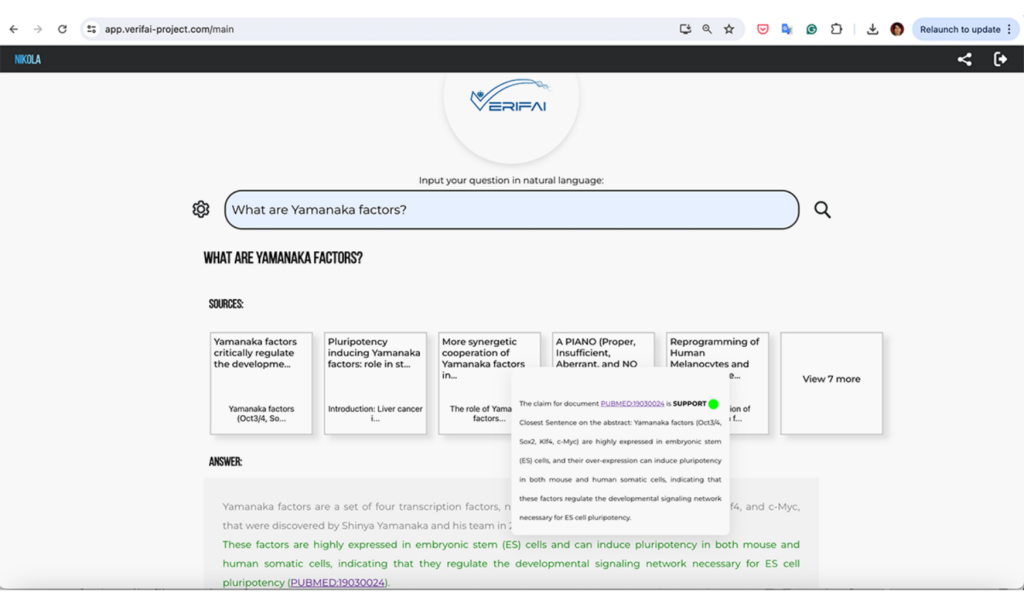VerifAI is an innovative project from Serbia aimed at transforming the field of biomedicine by offering a generative system that provides referenced and verified answers to complex biomedical questions. The project was created as a collaboration between Bayer and the Research-Development Institute for Artificial Intelligence of Serbia and has received funding from the Horizon Europe initiative, specifically under the Next Generation Internet Search program.
The concept for VerifAI emerged at a time when generative models, such as GPT-3 and GPT-3.5, became more accessible through tools like ChatGPT in 2023. However, Nikola, the founder of VerifAI, and his team quickly realized that while these models produce coherent answers, they often contain inaccuracies or “hallucinations” that don’t reflect the truth, especially in scientific domains. Moreover, traditional generative models do not provide sources to back up their answers—something critical in fields like biomedicine.
“In many areas, especially in science and biomedicine, the source of data is crucial. Answers need to be verified and accurate, without the hallucinations common in large language models. VerifAI was created to address these issues,” said Nikola, founder of VerifAI.

How VerifAI Works: Generative Search with Verified Responses
VerifAI operates as a generative system that answers biomedical questions with referenced and verified answers. Users can input questions, and the system searches for the most relevant works using a combination of semantic and lexical searches. It then generates an answer, referencing scientific papers for each response, and allows users to see which sentence is based on which paper, offering clickable links for further reading.
The project has fine-tuned the Mistral model, but ensuring the accuracy of generated answers posed a significant challenge. To address this, the team developed another AI model that checks whether every sentence in the text is genuinely based on the referenced work. This model operates on a traffic light system, with sentences highlighted in green, yellow, or red, depending on how well they align with the sources. Sentences with no references are shown in gray.
This system is designed to help doctors make more informed treatment decisions, and is also useful for biology and medicine students, as well as patients seeking detailed information on treatments.
Challenges and Unique Features of VerifAI
While VerifAI has the potential to revolutionize biomedical research, the team has faced some technical challenges, particularly the need for advanced servers equipped with high-end graphics cards to process and generate responses quickly. Another important challenge is maintaining data privacy—VerifAI does not store user-generated questions or answers unless explicitly requested by the user. All user data is encrypted, and the system uses secure traffic protocols to protect user information.
What sets VerifAI apart from its competitors is its focus on scientific papers and its built-in system to detect hallucinations or inaccuracies. This provides users with confidence that the answers they receive are verified and expert-reviewed.
VerifAI’s Development Team
VerifAI was developed by a skilled team of researchers from the Institute for Artificial Intelligence, including Dr. Bojana Basaragin, Dr. Adela Ljajić, Miloš Košprdić, and Darija Medvecki, along with collaborators from Bayer’s R&D Department, Dr. Nikola Milošević and Lorenzo Cassano. During the development process, the team expanded to include Angela Pupovac for marketing, as well as Nataša Radmilović and Petar Stevanović, who supported web development and design.
Real-World Use and Positive Feedback
VerifAI has already been tested by doctors, educators, and various departments within Bayer, all of whom have provided positive feedback. The system has shown significant potential to assist healthcare professionals and educators in fields such as medical education and pharmaceutical research.
Monetization and Future Business Models
Although VerifAI is currently free, the team recognizes the need for a sustainable business model due to ongoing costs for servers and salaries. Several monetization strategies are being considered, including a freemium model where free users would have a limited number of daily questions, while premium users would enjoy unlimited access and priority on system resources.
Additionally, VerifAI is exploring partnerships with medical institutions that could pay a subscription fee for the service. Another option is to customize the system for corporate use, allowing companies to ask questions based on their internal documents. VerifAI would charge an annual license fee for this feature, while maintaining free access for basic users.
The Future of VerifAI
Looking ahead, VerifAI plans to expand its functionality by working on new language models, including one for the Serbian language, and potentially localizing the system for other languages. The team is also exploring the possibility of detecting AI-generated content such as fake news, videos, and images, which would provide an additional level of protection for internet users.
“We believe that artificial intelligence has a significant role to play in fields like biomedicine, where it’s impossible for humans to keep up with the sheer volume of new research,” says Nikola. “Systems like VerifAI can help doctors, researchers, and students navigate the vast amount of data more effectively, making better-informed decisions.”
Invitation to Join VerifAI’s Growth
As VerifAI continues to evolve, Nikola invites users to register on the system and follow its progress. “We welcome users to be part of our journey and see how the system improves over time. You can also follow us on social media to stay updated on new developments,” he adds.
VerifAI is poised to make a significant impact on the biomedical field, providing trusted, verified information to support healthcare professionals and researchers in their decision-making processes.





